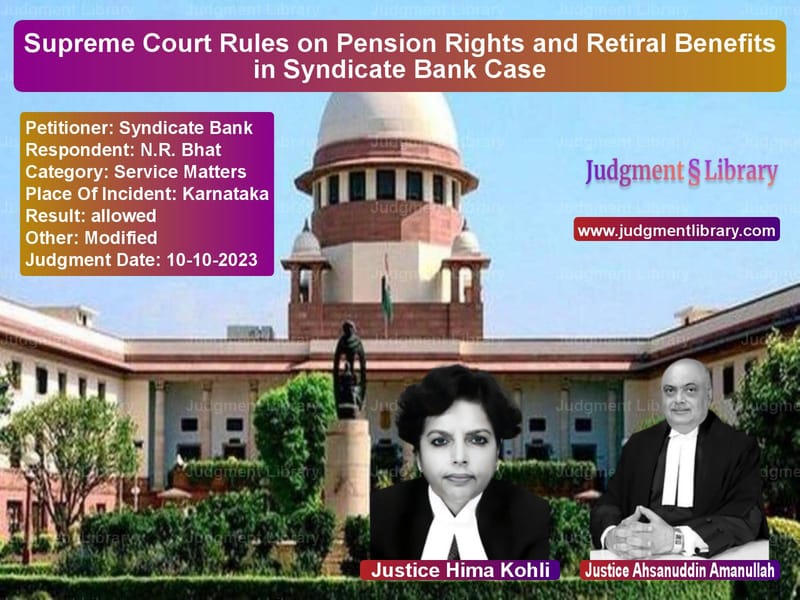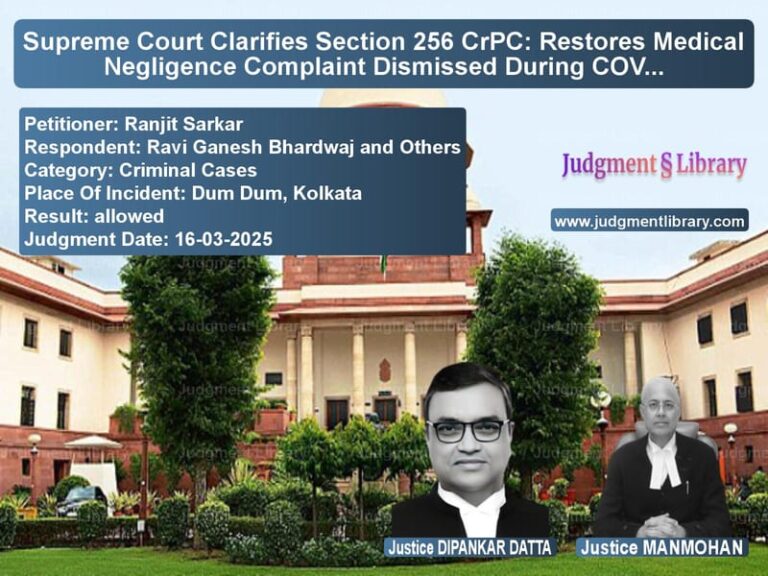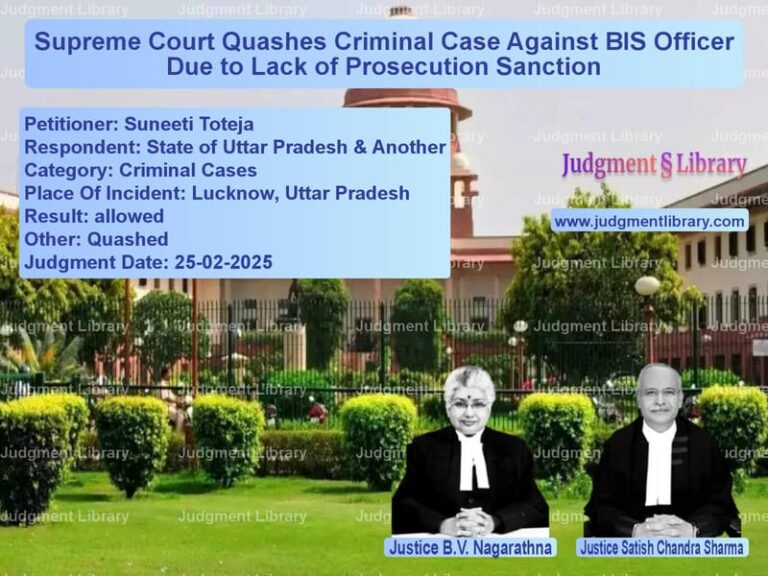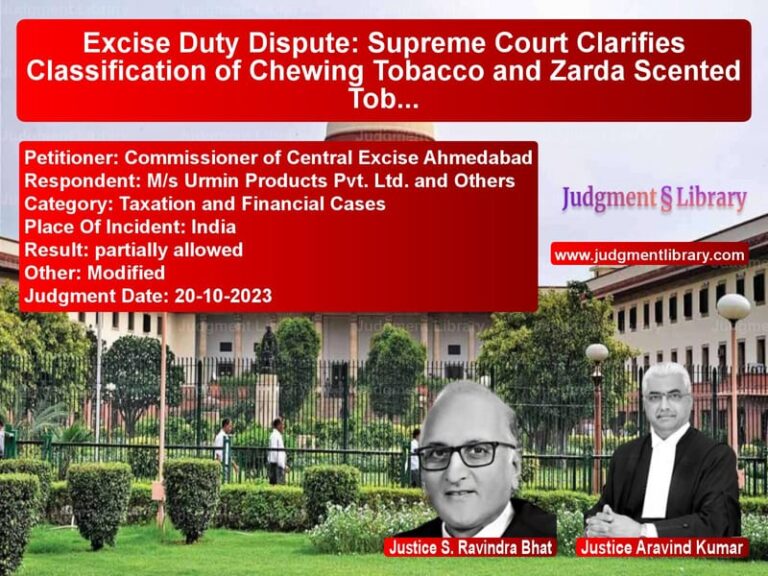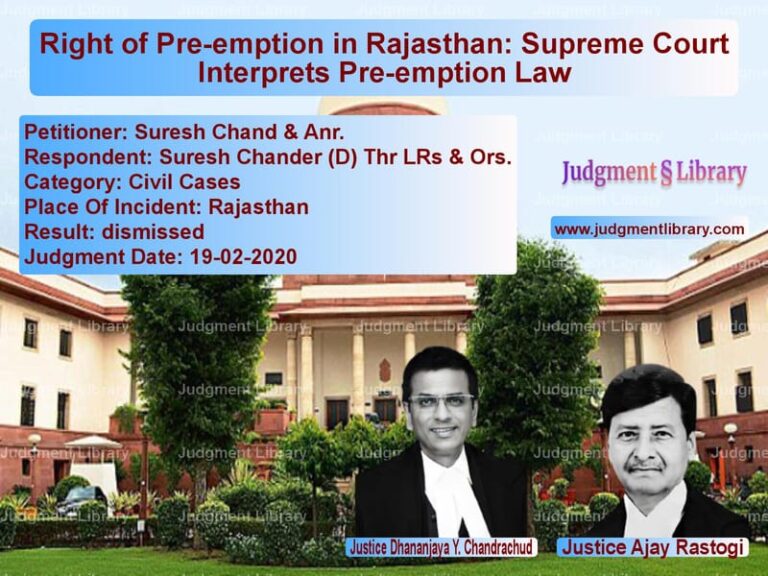Supreme Court Rules on Pension Rights and Retiral Benefits in Syndicate Bank Case
The Supreme Court of India has delivered a significant ruling in the case of Syndicate Bank v. N.R. Bhat, concerning the pension rights of a dismissed bank employee. The judgment highlights the legal interpretation of pension entitlements, the impact of settlements on employment benefits, and the importance of timely compliance with court orders.
Background of the Case
The dispute originated from the dismissal of N.R. Bhat from Syndicate Bank following disciplinary proceedings. The key events leading up to the Supreme Court’s ruling are as follows:
- 1969: N.R. Bhat joined Syndicate Bank as an Officer Trainee.
- 1982: He was suspended due to disciplinary proceedings.
- 1997: The bank dismissed him from service.
- 2005: The Karnataka High Court set aside the dismissal order, directing reconsideration.
- 2019: A settlement was reached where Bhat’s dismissal was substituted with a penalty, allowing him to claim retiral benefits.
- 2020: Syndicate Bank challenged the High Court’s decision in the Supreme Court, arguing that Bhat was not entitled to pension since he had not opted for it when given the opportunity in 1995 and 2010.
Key Legal Issues
- Whether the respondent-employee was entitled to pension benefits despite not opting for it earlier.
- Whether the settlement reached in 2019 permitted a subsequent claim for pension.
- Whether the bank was justified in withholding retiral benefits for an extended period.
- Whether the High Court’s order allowing the respondent to exercise his pension option was valid.
Arguments by the Petitioner (Syndicate Bank)
The petitioner, Syndicate Bank, contended:
- The Joint Memo of Settlement in 2019 did not include a provision for pension.
- Bhat had two prior opportunities to opt for pension, in 1995 and 2010, but failed to do so.
- The High Court exceeded its jurisdiction by allowing the employee to apply for pension benefits after finalizing the settlement.
- Allowing such claims would set a precedent enabling retired employees to seek benefits they had earlier opted out of.
Arguments by the Respondent (N.R. Bhat)
Bhat, through his counsel, countered:
- The High Court’s 2019 order provided him with an opportunity to exercise his pension option.
- The settlement agreement explicitly allowed him to claim retiral benefits, which should include pension.
- The bank unjustifiably delayed the release of his dues, causing financial hardship.
- Since his dismissal had been revoked, he should be treated as a retired employee, making him eligible for pension under the applicable regulations.
Supreme Court’s Observations
On the Right to Pension
The Court ruled that Bhat was not entitled to pension as he had failed to opt for it during the designated windows in 1995 and 2010. The Court noted:
“Even if the employment relationship was restored, the respondent had ample opportunity to exercise the pension option earlier, which he failed to do.”
On the Scope of the 2019 Settlement
The Court emphasized that the settlement agreement did not create a fresh right to pension:
“The settlement was conclusive and did not include a provision for pension. Allowing the respondent to claim pension benefits post-settlement would amount to rewriting the agreement.”
On the Delay in Paying Retiral Benefits
The Court criticized the bank’s delay in implementing the settlement and ordered it to pay interest:
“The bank’s failure to release the settlement dues in a timely manner is unjustified. Compensation is warranted for the delay.”
Final Judgment
The Supreme Court ruled:
- Bhat’s claim for pension was invalid as he had not opted for it earlier.
- The High Court’s order allowing him to apply for pension was overturned.
- Syndicate Bank must pay interest at 12% per annum on the delayed retiral benefits from July 1, 2019, until the date of payment.
- Failure to comply within four weeks would increase the interest rate to 15%.
Impact of the Judgment
- Reinforces strict adherence to pension eligibility timelines.
- Limits post-settlement claims for additional benefits.
- Ensures timely disbursal of retiral benefits.
- Sets a precedent for employer-employee settlements in banking and service sectors.
Conclusion
The Supreme Court’s ruling clarifies that pension claims must be exercised within stipulated periods and cannot be revived post-settlement. The judgment also serves as a warning to employers to promptly release retiral dues to avoid financial penalties.
Petitioner Name: Syndicate Bank.Respondent Name: N.R. Bhat.Judgment By: Justice Hima Kohli, Justice Ahsanuddin Amanullah.Place Of Incident: Karnataka.Judgment Date: 10-10-2023.
Don’t miss out on the full details! Download the complete judgment in PDF format below and gain valuable insights instantly!
Download Judgment: syndicate-bank-vs-n.r.-bhat-supreme-court-of-india-judgment-dated-10-10-2023.pdf
Directly Download Judgment: Directly download this Judgment
See all petitions in Pension and Gratuity
See all petitions in Termination Cases
See all petitions in Public Sector Employees
See all petitions in Employment Disputes
See all petitions in Disciplinary Proceedings
See all petitions in Judgment by Hima Kohli
See all petitions in Judgment by Ahsanuddin Amanullah
See all petitions in allowed
See all petitions in Modified
See all petitions in supreme court of India judgments October 2023
See all petitions in 2023 judgments
See all posts in Service Matters Category
See all allowed petitions in Service Matters Category
See all Dismissed petitions in Service Matters Category
See all partially allowed petitions in Service Matters Category

